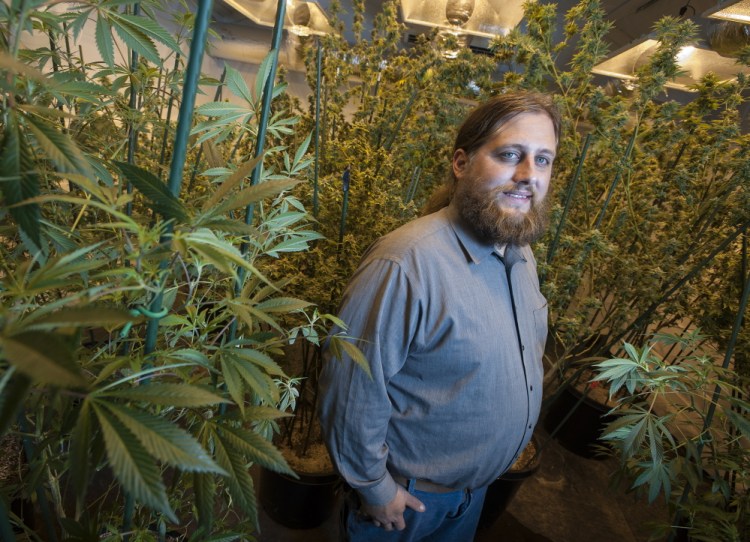A leading activist for marijuana legalization says he was detained at the Canadian border Monday and denied entry after agents determined he had been arrested during a 2008 protest in St. Paul, Minnesota.
Paul McCarrier, president of Legalize Maine, a nonprofit advocacy group that helped to pass a statewide ballot measure that legalized recreational marijuana in 2016, posted on Facebook that he had been denied entry to Canada at the Coburn Gore border crossing in northern Franklin County on Labor Day.
McCarrier, who was traveling on vacation with his girlfriend, said border agents mentioned his role with the pro-marijuana organization while they searched the couple’s belongings and vehicle, and that he believes that disclosure played a role in his treatment.
In a subsequent post, McCarrier’s girlfriend said the agents determined who McCarrier was when they saw his title on a business card among their possessions.
“It looks like we won’t be heading to Canada,” McCarrier wrote on his Facebook page Monday. “Detained at the border for almost two hours – and denied entry for a protest arrest from 9 years ago! Apparently, being arrested but then acquitted by a judge is the same thing as being convicted in the eyes of some bureaucrap. Oh and our car was searched and all our belongings torn through and left open. I’ll refrain from any other choice words right now. We won’t let this stop us and are working on Plan B. I’ll see my favorite band this week – no effed up policy will stop that … stay tuned.”
Legalize Maine advocates for small marijuana growers. In addition to his involvement with the 2016 ballot question initiative, McCarrier is a registered lobbyist at the State House in Augusta.
McCarrier said he had intended to travel to Montreal to see the band Depeche Mode. In messages Thursday to the Portland Press Herald, he declined to comment on the situation, noting he was working with an attorney to get a waiver from Canadian authorities so he could travel to Canada in the future.
But McCarrier did say he believed his role as president for Legalize Maine was a “factor” in being denied entry, and explained that he had been arrested during a protest against then-President George W. Bush during the Republican Party’s 2008 national convention in Minnesota.
ISOLATED INCIDENT OR NEW SCRUTINY?
According to media reports about the incident and a subsequent court case, McCarrier was among a group of more than 200 protesters charged with obstructing legal process, disorderly conduct, unlawful assembly and blocking traffic.
He said a judge ultimately dismissed the charges against the protesters, but that didn’t seem to have any bearing on the decision by officials to deny him entry to Canada. Media reports from the time confirmed that a Ramsay County judge dismissed the charges against the protesters.
McCarrier said he wasn’t bringing any marijuana into Canada and he was not charged by Canadian authorities with any crime.
It was not immediately clear whether McCarrier’s experience was an isolated incident or if travelers are facing increased scrutiny at the border. Other Mainers also have encountered close scrutiny by Canadian border officials, including being detained for hours before being either turned around and denied entry, sometimes based on arrest records from several years or even decades ago, or being allowed to travel.
Caitlyn Hamilton, a communications officer for the Atlantic Region of Canada’s Border Service Agency, said in an email Thursday that there had not been a recent change in policy at the border that would prompt any crackdowns on Americans with arrest records.
“There have been no changes to admissibility requirements for those entering Canada,” Hamilton wrote. “Admissibility to Canada is considered on a case-by-case basis and is based on information that is available to our officers at the time of entry.”
SEEING THE BAND PLAY AFTER ALL
Hamilton said travelers with criminal histories should be prepared to face questions. Canada has long denied those previously convicted of operating under the influence from entering the country without a special waiver, but any criminal history could become a problem, she said.
“A criminal conviction can make a person inadmissible to Canada. For that reason, travelers must be prepared to discuss their criminal history with a (border security) officer when arriving in Canada,” she said in the email. “To overcome inadmissibility, criminally inadmissible individuals must obtain rehabilitation approval, or have been pardoned. For individuals with a pardon, it is strongly recommended to have your pardon documentation on hand.”
Although applying for “rehabilitation approval” may help them cross the border in the future, McCarrier and his girlfriend ultimately turned around Monday and drove to Washington, D.C., where they were set to see Depeche Mode play Thursday night.
McCarrier said Thursday that the English band apparently had seen reports of his run-in with Canadian authorities, and the band’s tour manager reached out to him via email to make sure he had tickets for the show.
“Depeche Mode’s music has always spoken to us,” McCarrier said in an email. “Questioning the political climate of the era and thinking for yourself. We are thankful the group cares about its fans like this and understands the importance of questioning authority.”
Scott Thistle can be contacted at 791-6330 or at:
sthistle@pressherald.com
Twitter: thisdog
Send questions/comments to the editors.




Success. Please wait for the page to reload. If the page does not reload within 5 seconds, please refresh the page.
Enter your email and password to access comments.
Hi, to comment on stories you must . This profile is in addition to your subscription and website login.
Already have a commenting profile? .
Invalid username/password.
Please check your email to confirm and complete your registration.
Only subscribers are eligible to post comments. Please subscribe or login first for digital access. Here’s why.
Use the form below to reset your password. When you've submitted your account email, we will send an email with a reset code.